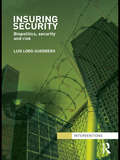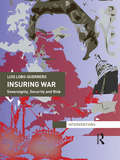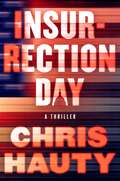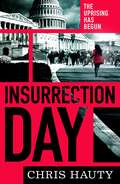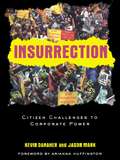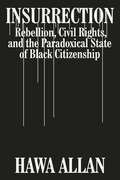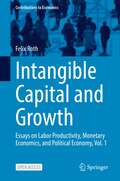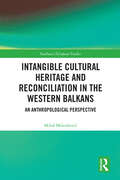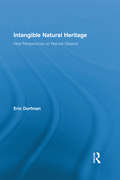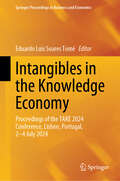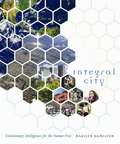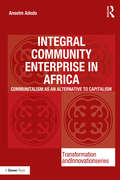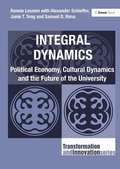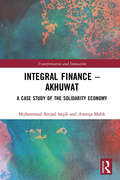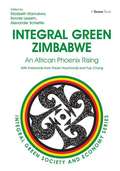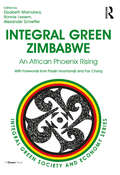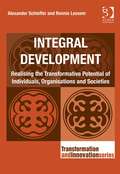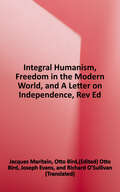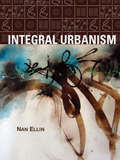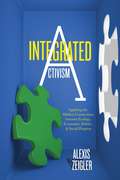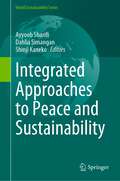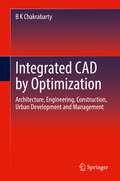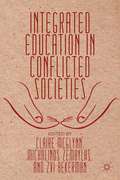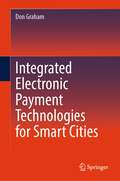- Table View
- List View
Insuring Security: Biopolitics, security and risk (Interventions)
by Luis Lobo-GuerreroInsurance is the world’s largest economic industry, providing a form of security that more than triples global defence expenditure. However, little is know about the form of security insurance provides. This book offers a genealogical interrogation of the relationship between security and risk through its materialisation in insurance. This work seeks to argue that insurance practices ascribe value to life and in so doing produce a form of security central to the understanding of contemporary liberal governance and security. Lobo-Guerrero theorizes insurance as a biopolitical effect that results from the continuous interaction of an ‘entrepreneurial form of power’, and traditional forms of sovereign security. Through rich empirical cases and a unique theorization, the book breaks apart the traditional division between security studies, political economy and political theory. The author explores this theory in relation to specific issues such as the use of life insurance in the molecular age, the use of insurance to securitize against environmental catastrophic risk, specialist products such as kidnap and ransom insurance, as well as the use of insurance to counter maritime piracy in the twenty-first century. Providing an important and original contribution to the study of the biopolitics of security, this work will be of great interest to all scholars of security studies, international relations and international political economy. Insuring War: https://www.routledge.com/products/search?keywords=insuring+war Insuring Life: https://www.routledge.com/Insuring-Life-Value-Security-and-Risk/Lobo-Guerrero/p/book/9780415716079
Insuring War: Sovereignty, Security and Risk (Interventions)
by Luis Lobo-GuerreroInsurance is a central, if until now ignored, instrument of war in the modern period. Ever since the eighteenth century, interaction between governments and insurers in Western countries has materialised in the form of war risk schemes that have contributed to the waging of war and the preservation of peace. The operation of those schemes has given rise to a curious, if not innocent, association between practices of statehood and practices of risk, which are theorised here under the label of ‘insurantial sovereignty’. The book draws on the British experience of using maritime insurance as an instrument of war during the Napoleonic Wars, the two World Wars, and the early twenty-first century. It asks, what happens, when, under conditions of war, the sovereign adopts insurantial imaginaries and practices into its rationalities of government? In doing so the book makes a novel contribution to the understanding of liberal security and liberal governance which is central to the theory of Political Science and International Relations, the understanding of international political sociology, and international political economy. The book follows Insuring Security: Biopolitics, Security and Risk as the second of a trilogy that analyses how concepts and practices of power, risk and security materialise in the form of insurance as a central instrument of governance in the liberal world. Insuring Security: https://www.routledge.com/Insuring-Security-Biopolitics-security-and-risk/Lobo-Guerrero/p/book/9780415522854 Insuring Life: https://www.routledge.com/Insuring-Life-Value-Security-and-Risk/Lobo-Guerrero/p/book/9780415716079
Insurrection Day: A Thriller
by Chris HautyThe nationally bestselling &“twisty, electrifying&” (Karin Slaughter, #1 international bestselling author) Hayley Chill series continues with this novella following the former Washington, DC, intern as she faces a violent uprising at the United States Capitol. During the course of one terrifying and chaotic day, nativist forces stage a violent uprising by storming the Capitol. Authorities are unprepared to protect the nation&’s elected representatives as the country&’s citadel of democracy is breached in what appears to be a spontaneous insurrection. Hayley Chill, in the building for other business, does what she can to rescue a powerful senator and his staff. But in doing so, she discovers shocking evidence that the uprising had its beginnings with one of the country&’s long-standing overseas enemies. With no one else to trust, Hayley must prevent as many deaths as possible while also chasing down foreign operatives across the city before they abscond with what she understands to be critical national intelligence.
Insurrection Day: The gripping new Hayley Chill novella
by Chris HautyTHE UPRISING HAS BEGUN Hayley Chill has twenty-four hours to stop a violent revolt. The insurrection, taking the form of a storming of the Capitol Building, appears to be wholly spontaneous and disorganized. But is it? As the situation spirals out of control, authorities on the ground are utterly unprepared to protect the nation's elected representatives from the crowd's vengeance. When Hayley Chill rescues a powerful senator and his staff from the mob&’s clutches, she discovers shocking evidence that the uprising is led by one of the country&’s longstanding adversaries. Non-stop action shifts from Capitol Hill to a pursuit across Washington DC as Hayley chases down foreign operatives to make them answer for their crimes. Partly inspired by true events, this is a blistering novella featuring much-loved series character, Hayley Chill, and her fight against the powerful forces that threaten to overthrow democracy. Praise for Chris Hauty 'Hayley Chill is relentlessly smart and brave in this twisty, electrifying thriller' KARIN SLAUGHTER 'Full of twists, this one will keep you hooked to the very end' JAMES SWALLOW 'One of the most surprising double-reverse plot twists I have seen in some time' NEW YORK TIMES &‘Brilliantly fast-moving and absorbing&’ SUNDAY TIMES CRIME CLUB The HAYLEY CHILL thriller series #1 DEEP STATE #2 SAVAGE ROAD #3 STORM RISING
Insurrection and Intervention
by Ned DobosDomestic sovereignty (the right of a government not to be resisted by its people) and international sovereignty (the moral immunity from outside intervention) have both been eroded in recent years, but the former to a much greater extent than the latter. An oppressed people's right to fight for liberal democratic reforms in their own country is treated as axiomatic, as the international responses to the revolutions in Tunisia, Egypt and Libya illustrate. But there is a reluctance to accept that foreign intervention is always justified in the same circumstances. Ned Dobos assesses the moral cogency of this double standard and asks whether intervention can be consistently and coherently opposed given our attitudes towards other kinds of political violence. His thought-provoking book will interest a wide range of readers in political philosophy and international relations.
Insurrection: Citizen Challenges to Corporate Power
by Kevin Danaher Jason MarkFrom uncovering major retailers' links to sweatshop abuses and revealing the deception of American tobacco companies, to questioning corporations' ties to repressive dictators, shaming food processors into selling dolphin-safe tuna and demanding that businesses stop destroying old growth forests, citizens have become far more aggressive in directly
Insurrection: Rebellion, Civil Rights, And The Paradoxical State Of Black Citizenship
by Hawa AllanA brilliant debut by lawyer and critic Hawa Allan on the paradoxical state of black citizenship in the United States. The little-known and under-studied 1807 Insurrection Act was passed to give the president the ability to deploy federal military forces to fend off lawlessness and rebellion, but it soon became much more than the sum of its parts. Its power is integrally linked to the perceived threat of black American equity in what lawyer and critic Hawa Allan demonstrates is a dangerous paradox. While the Act was initially used to repress rebellion against slavery, during Reconstruction it was invoked by President Grant to quell white-supremacist uprisings in the South. During the civil rights movement, it enabled the protection of black students who attended previously segregated educational institutions. Most recently, the Insurrection Act has been the vehicle for presidents to call upon federal troops to suppress so-called “race riots” like those in Los Angeles in 1992, and for them to threaten to do so in other cases of racial justice activism. Yet when the US Capitol was stormed in January 2021, the impulse to restore law and order and counter insurrectionary threats to the republic lay dormant. Allan’s distinctly literary voice underscores her paradigm-shifting reflections on the presence of fear and silence in history and their shadowy impact on the law. Throughout, she draws revealing insight from her own experiences as one of the only black girls in her leafy Long Island suburb, as a black lawyer at a predominantly white firm during a visit from presidential candidate Barack Obama, and as a thinker about the use and misuse of appeals to law and order. Elegant and profound, deeply researched and intensely felt, Insurrection is necessary reading in our reckoning with structural racism, government power, and protest in the United States.
Intangible Capital and Growth: Essays on Labor Productivity, Monetary Economics, and Political Economy, Vol. 1 (Contributions to Economics)
by Felix RothFor several decades now, advanced economies across the globe have been undergoing a process of rapid transformation towards becoming knowledge economies. It is now widely recognized that intangible capital has been a crucial element in the growth performance of these economies and their firms. The term serves as a useful device for capturing those dimensions of capital that are not tangible in nature but are nevertheless fundamentally important for growth. It encompasses investments in education (human capital) and in informal (social capital) and formal (rule of law) institutions by the public sector and households, as well as investments by businesses aimed at enhancing their knowledge base, such as software, innovative property, and economic competencies.Intangible Capital and Growth is the first of two open-access volumes presenting a selection of the author's essays on Labor Productivity, Monetary Economics, and Political Economy. This first volume brings together eight of the author's essays, selected with the aim of providing an overview of his research to date on intangible capital and growth.
Intangible Cultural Heritage and Reconciliation in the Western Balkans: An Anthropological Perspective (ISSN)
by Miloš MilenkovićThis book considers the sensitive heritage elements linked to the very issue of the origins of nations. Beliefs, rituals, and traditional knowledge are examples of intangible cultural heritage (ICH), which communities globally regard as the core of their cultural identity. When it is unclear which element of heritage “belongs” to whom, like in the Western Balkans, where the majority of heritage elements are shared, ICH disputes exacerbate conflict. Its mishandling is especially acute when minority heritage is excluded from governmental cultural policies. With a focus on Serbia, Croatia, Bosnia and Herzegovina, and Montenegro, this book has a global thematic scope, theoretical depth, and policy relevance to the scholars of anthropology and heritage studies as well as to those interested in cultural diversity, human rights, and cultural and educational policies. It will serve as a guide for those who professionally use cultural heritage, or want to start doing so, in the processes of reconciliation, stabilization, and development.
Intangible Natural Heritage: New Perspectives on Natural Objects
by Eric DorfmanThe topic of intangible natural heritage is new, recently emerging as an important subject of inquiry. It describes the untouchable elements of the environment that combine to create natural objects, and help define our relationship to them. These elements can be sensory, like auditory landscapes, or processes like natural selection. As a concept, intangible natural heritage is growing in prominence, as museums are increasingly charged safeguarding and interpreting the milieux from which their objects originate. This book is a significant advance on the subject of intangible natural heritage; no book on the topic has yet been written and current scholarship is confined to a few isolated papers. As such, there exists a wide variety of perspectives on the topic. Intangible Natural Heritage presents a spectrum of opinion, making the first attempt at a unifying concept on which future work can be based. Authors from Europe, Asia, Australasia, Britain, and North America, address topics on scales from minute insects to sweeping landscapes. The common thread in these explorations is the importance of human relationships with nature that is passed down from generation to generation. In a world that is becoming increasingly fragile, recognizing and fostering these relationships has never been more vital.
Intangibles in the Knowledge Economy: Proceedings of the TAKE 2024 Conference, Lisbon, Portugal, 2–4 July 2024 (Springer Proceedings in Business and Economics)
by Eduardo Luis Soares ToméThis book features selected chapters from the proceedings of the Multidisciplinary Conference on Intangibles (TAKE), held in Lisbon, Portugal, in July 2024. The chapters cover a wide range of topics , including human resource development, intellectual capital, knowledge management, logistics, retailing, public policy, innovation and entrepreneurship, business models, competitiveness, and accounting. The book is a valuable resource for researchers, practitioners, and industry experts interested in shaping the future of the knowledge economy.
Integral City: Evolutionary Intelligences for the Human Hive
by Marilyn HamiltonThe original inspiration for this book must come from my father, Jack Douglas Herbert, one of Canada's seminal museum developers. When I was eight, he told me to write about what I know (and of course, now I know my pursuit of knowing is a never-ending quest).
Integral Community Enterprise in Africa: Communitalism as an Alternative to Capitalism (Transformation and Innovation)
by Anselm AdodoAt a time of global economic crisis and disillusionment with capitalism, Adodo offers refreshing and positive insight into a more integral way of business management, enterprise and community development as well as holistic healing in Africa. For over three decades, Africa was the recipient of billions of dollars in aid funds that were meant to catapult the continent from undeveloped to developed status. Yet the more the aid poured in, the poorer African countries became. The devastating effect of western economic models in Africa that followed is well documented. Integral Community Enterprise in Africa exposes the limitations of existing theories, such as capitalism, socialism and communism, and shows how western theories were imposed on Africa. Such imposition of concepts and ideas is not only demeaning but also unsustainable, serving only the interest of the elite. Father Anselm Adodo argues for the need to have a southern theory to serve as an alternative to western theories. The majority of African intellectuals and activists, while criticizing existing theories, often do not provide alternative theories to address the prevalent inadequacies entrenched in conventional social, political and economic systems. This revolutionary book aims to address this lapse and proposes the theory of communitalism as a more indigenous, sustainable and integral approach to tackling the social, political, economic and developmental challenges of today’s Africa. There is an African alternative to capitalism, socialism and communism – a surer path to sustainable development in and from Africa. This is a book that is positioned at the very core of a much needed African Renaissance. A profoundly new approach to development in Africa, this is essential reading for anyone concerned with authentic development in Africa and in the world.
Integral Dynamics: Political Economy, Cultural Dynamics and the Future of the University
by Ronnie Lessem Alexander Schieffer Junie T. Tong Samuel D. RimaThe theory of integral dynamics is based on the view that the development of individual leaders or entrepreneurs requires the simultaneous development of institutions and societies. It seeks a specific way forward for each society, fundamentally different from, but drawing on, its past. Nearly every natural science has been transformed from an analytically-based approach to a dynamic one: now it is time for society and culture to follow suit locally and globally. Each culture, discipline and person is incomplete and is in need of others in order to develop and evolve.
Integral Finance – Akhuwat: A Case Study of the Solidarity Economy (Transformation and Innovation)
by Muhammad Amjad Saqib Aneeqa MalikThere are many misconceptions and concerns regarding Islamic societies and how Muslim countries have failed to come up with their own localised solutions to socio-economic problems in dealing with poverty alleviation and societal development. This book explores why there is so much disconnect between spirituality and enterprise development in the world today, and how a part of the Islamic world, in fact located in Pakistan, can be part of the solution rather than being central to the problem. This book builds upon Ronnie Lessem and Alexander Schieffer’s theory of ‘integral dynamics’ which works through a fourfold rhythm of the GENE. Set against a mono-cultural perspective, the authors highlight the ever-increasing and deepening divide between Western and Islamic cultures. Through the course of the book, the authors use the transformational GENE (Grounding, Emergence, Navigation, Effect) rhythm developed by Lessem and Schieffer to take readers through the 4C (Call, Context, Co-creation and Contribution) process, articulated to CAREing-4-Society. They ground their call in Akhuwat’s community of Akhuwateers (donors, beneficiaries, borrowers, volunteers and replicators), to explore alternative models of spiritually based finance through an emerging SOUL-idarity paradigm. Furthermore, through these models and Akhuwat’s CARE (Community, Awareness, Research, Embodiment) process, they put forward that encouraging community activism, raising awareness around Islamic practices of Qard-e-Hasan, institutionalising their innovative research, and finally transforming and educating the community, will provide an alternative to microfinance for poverty alleviation. Showcasing an unconventional spiritual-financial solution, deeply immersed in spirituality and infused with local moral values and traditions, this book demonstrates how poverty can be alleviated in countries around the world, specifically, in developing Muslim countries.
Integral Green Zimbabwe: An African Phoenix Rising (Integral Green Society And Economy Series #1)
by Ronnie Lessem Alexander Schieffer Elizabeth MamukwaIntegral Green Zimbabwe: An African Phoenix marks the debut of the Integral Green Society and Economy series, which links the philosophical 'integral' age with the practical 'green' movement. <P><P>The series blends elements of nature and community, culture and spirituality, science and technology, politics and economics--while this particular volume focuses specifically on Zimbabwe, as well as Southern Africa, drawing on the particular issues and capacities that this country and region represent.
Integral Green Zimbabwe: An African Phoenix Rising (Integral Green Society And Economy Series #1)
by Ronnie Lessem Alexander Schieffer Elizabeth MamukwaIntegral Green Zimbabwe: An African Phoenix Rising by Ronnie Lessem, Alexander Schieffer and Liz Mamukwa is the first book in the Integral Green Society and Economy series, a series which has three overarching aims. The first aim is to link together two major movements of our time, one philosophical, the other practical. The philosophical movement is towards what many today are calling an 'integral' age, while the practical is the 'green' movement, duly aligned with that of sustainable development. The second is to blend together elements of nature and community, culture and spirituality, science and technology, politics and economics, thus serving to bring about an 'integral green' vision, albeit with a focus on business and economics. As such, the authors transcend the limitations to sustainable development and environmental economics, which are overly ecological, if not also technological, in orientation, and exclude social and cultural elements. Thirdly, this particular volume focuses specifically on Zimbabwe, as well as Southern Africa, drawing on the particular issues and capacities that this country and region represents. The emphasis on Zimbabwe and Southern Africa transpired not only because two of the editors (Lessem and Mamukwa) are Zimbabwean in origin, but because Zimbabwe is today like a phoenix rising from the ashes, and has the opportunity to recreate itself anew.
Integral Human Development: Self, Enterprise, and Society
by Ronnie Lessem Alecander SchiefferSchieffer and Lessem introduce a groundbreaking development framework and process to address the most burning issues that humanity faces. While conventional top-down, outside-in development has reached a cul-de-sac, a new, integral form of development is emerging around the world. Integral Development uniquely articulates this emergent approach, and invites us to fully participate in this process. Integral Development combines four mutually reinforcing perspectives: nature and community; culture and spirituality; science, systems and technology; and enterprise and economics. Conventional development theory and practice has prioritized the latter two perspectives, neglecting the former two. This has caused massive imbalances in today's world. Integral Development shows how individual, organizational and societal developments need to be interconnected to overcome these imbalances and to release a society's full potential. It shifts the responsibility for large-scale development from often-distant development experts and organizations to each individual, community, enterprise and institution within the society.
Integral Humanism: Freedom in the Modern World, and a Letter on Independence
by Jacques MaritainThe three books presented in this volume, Integral Humanism, Freedom in the Modern World, and A Letter on Independence, were all written in the early 1930s, a time of dire trouble for France. France was then surrounded by enemies preparing for war and was itself so violently split between parties of Left and Right that it seemed on the verge of civil war. In this collection, Jacques Maritain accepts the responsibility of a Christian philosopher to actively address the agonizing practical problems of the time. Maritain discusses major political issues such as the relation of freedom and religion, the opposition of democracy to any form of totalitarianism, the relation of the spiritual and the temporal, the need for an integral and Christian humanism, and the prospects for a new Christian civilization, all in opposition to the materialism of both communism and capitalism. Against the fierce antagonism of the parties of the political Left and Right, Maritain declares a plague on both their houses and strongly affirms the need for independence from both of them. He does so by distinguishing between two senses of the terms Left and Right, one denoting a temperamental or physiological disposition, the other a definite political position. In the latter sense, Maritain asserts that he is independent while acknowledging that he is, by temperament, a man of the Left.
Integral Urbanism
by Nan EllinIntegral Urbanism is an ambitious and forward-looking theory of urbanism that offers a new model of urban life. Nan Ellin's model stands as an antidote to the pervasive problems engendered by modern and postmodern urban planning and architecture: sprawl, anomie, a pervasive culture - and architecture - of fear in cities, and a disregard for environmental issues. Instead of the reactive and escapist tendencies characterizing so much contemporary urban development, Ellin champions an 'integral' approach that reverses the fragmentation of our landscapes and lives through proactive design solutions.
Integrated Activism: Applying the Hidden Connections between Ecology, Economics, Politics, and Social Progress
by Alexis ZeiglerHow do peak oil, climate change, and the limits of growth affect abortion rights, income equality, and civil liberty? In this impassioned treatise, author and activist Alexis Zeigler reveals the hidden connections between ecology, economics, politics, and social justice--and shows us how to use these connections to effect real, long-lasting change.Most activist movements, says Zeigler, suffer from a kind of tunnel vision in which the true causes and resulting side effects of the desired change are left unexamined--rendering the movements shortsighted and unaware of their own long-term fallout. We cannot effectively address our problems in isolation or with ecological blinders on. Instead we must integrate our activism and ensure that all strategies and actions take into account the historically demonstrated fact that a society's environmental resources ultimately define its level of freedom, fairness, and financial equity.Packed with surprising facts and eye-opening arguments, Integrated Activism is a must-read not only for every serious activist, but also for anyone looking for a solid, creditable philosophy and approach to building a fairer, freer, more sustainable future.From the Trade Paperback edition.
Integrated Approaches to Peace and Sustainability (World Sustainability Series)
by Shinji Kaneko Ayyoob Sharifi Dahlia SimanganThis book provides new insights into the development of integrated approaches to peace and sustainability in the era of global change. Since the late 1980s, and in order to regulate the increasingly detrimental impacts of humans on the environment, the transition towards sustainability has been high on the agenda of researchers and policymakers alike. Meanwhile, peace considerations have expanded in recent decades to include the varied types and sources of conflict, from inter-state to intra-state conflicts due to various social, political, economic, and environmental factors. Through providing theoretical and empirical insights, this book demonstrates that sustainability and peace as intrinsically interrelated. The book elaborates on the multi-dimensional and constantly evolving concepts of sustainability and peace. In addition, the book contributes to a better understanding of the complex and dynamic interlinkages between peace and sustainability by presenting examples of pathways where sustainability and peace interact considering the different factors and contexts that are constantly shaping and reshaping the conditions for sustainable and peaceful societies.
Integrated CAD by Optimization: Architecture, Engineering, Construction, Urban Development and Management
by B K ChakrabartyThis book presents range of topics concerning integrated CAD (including Optimization) for use in Architecture (including Planning), Civil Engineering and Construction (AEC), and thus, helps introduce a full-length treatment of the subject, enabling practitioners to adopt an Integrated Computer-Aided Design Approach in their professional activity. The book gives to readers an understanding of the main elements of CAD, highlighting the importance of integrating these elements and the applicability of Integrated CAD in AEC. Many examples and problems (including Optimization) are included to help professionals and students to develop and apply such tools in solving problems in AEC field. Adopts a problem solving approach in planning, design, and management stressing IT and Computer Application in AEC sector as a whole;Emphasizes resource-efficiency and social equity in problem solution in the AEC sector in general, and in urban development and management in particular;Stresses optimization and an integrated approach covering all components, including costs, affordability and environmental factors, scarcity of resources, and resolution of conflicting interests;Includes an accessible overview and source codes of C++ and Auto Lisp programs needed to carry out design analysis, optimization and drafting-drawing in an integrated manner.
Integrated Education In Conflicted Societies
by Michalinos Zembylas Zvi Bekerman Claire McglynnAcademics and practitioners examine the developing field of integrated education in conflicted societies, where children who would normally be educated apart are deliberately educated together. They draw on a range of theoretical and practical frameworks, providing numerous case studies from Northern Ireland, Israel, Macedonia, and Cyprus.
Integrated Electronic Payment Technologies for Smart Cities
by Don GrahamThis book addresses the use of existing and emerging electronic payment technologies within a smart city in the context of the clear and proven value these systems have demonstrated in improving transportation. It addresses such question as How does the toll gantry work? How does it read the transponder tag and deduct the correct amount? How do cities harness the transaction data from mass transit to better meet the demand during peak hours? What can city planners do to make trip scheduling and payments seamless, so commuters can go from park-and-ride to mass transit to ride-share with a single payment platform? The volume is technical in nature and describes solid technical solutions to engineers and planners associated with smart cities initiatives. It is specifically designed to support smart city designers and engineers as they develop strategies that incorporate the latest payment system technologies. It will also be of value to private sector payment systems solution providers looking to deliver their products and services to smart cities. In addition, the book supplements technical perspectives with guidance on planning and implementation. For example, it defines procurement approaches for emerging technologies such as crypto currencies and block chain. Rounding out technical detail with advice on policy and the organizational framework required to underpin the technologies, the book delivers practical support to smart city technical practitioners. It further stands as an appropriate text for university courses associated with smart city planning, operations, and urban analytics. This book explores these questions and provides answers that a typical transportation planner can follow. It covers technology topics such as RFID (Radio Frequency ID), ETC (Electronic Toll collection), and ANPR (Automatic Number Plate Recognition). The book also delves into how contactless payment (Near-Field) technologies can be used in a smart city. Blockchain is introduced as a platform that is suitable for solving the problem of payment segregation and shows how the entities in a smart city can work together to provide a seamless payment solution for riders across different modes of transport. The book also covers some theoretical concepts of congestion pricing which students at the university level can apply to city planning projects and research into smart cities. Several examples of US-based and international smart city implementations are provided in the closing chapters which demonstrate new, innovative smart city techniques for the transportation planner.
